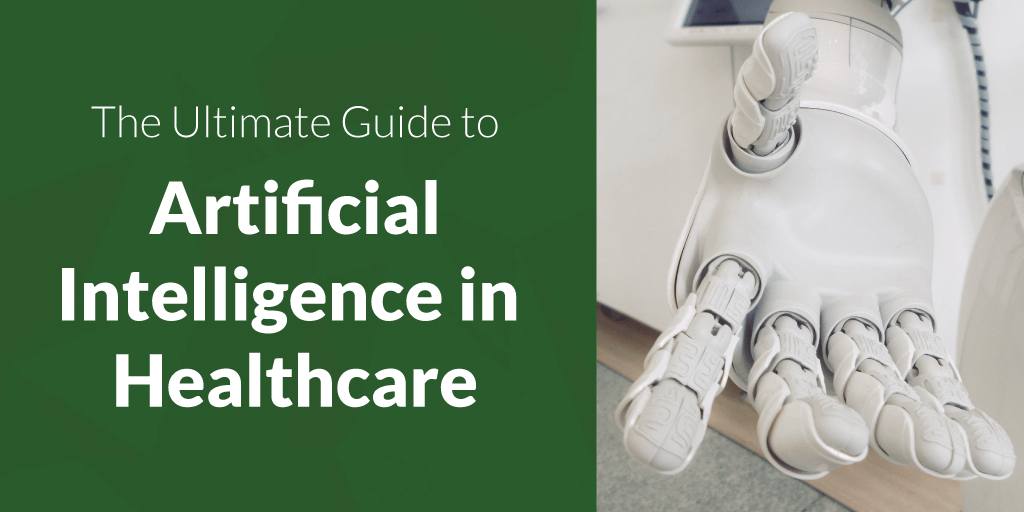
Editor's Note: The article was originally published in December 2018 and has been updated to reflect the current state of Artificial Intelligence in Healthcare.
What is Artificial Intelligence in Healthcare?
Artificial intelligence in healthcare refers to the application of machine learning algorithms and other AI techniques to analyze and interpret complex medical data, assist in clinical decision-making, improve patient outcomes, and enhance the efficiency of healthcare delivery.
Artificial intelligence (AI) plays a role in many industries, from banking and cybersecurity to product design and healthcare. Its applications are seemingly infinite. Artificial intelligence will continue to advance through new technology and innovation.
The benefits of leveraging technology in healthcare have the power to impact both your facility and patients. Some implementations include diagnostic capabilities and predicting disease, customized treatment plans, enhanced electronic health records, and more.
This guide has everything you need to know about artificial intelligence in healthcare. If you're looking for industry insights, barriers to AI adoption, or ways artificial intelligence will improve healthcare, you'll love this guide.
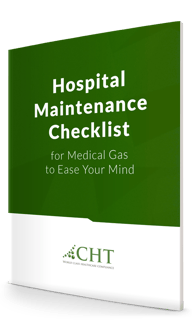
Contents
![]()
Chapters
- 1Healthcare Artificial Intelligence Industry Insights
- 2Barriers to Artificial Intelligence Implementation
- 3Advantages of Artificial Intelligence in Healthcare for an Improved Future
- 4Artificial Intelligence Study - How AI Technology Can Improve Human Lives
- 5The Future of Artificial Intelligence in Healthcare [2023 and Beyond]
CHAPTER 1
Healthcare Artificial Intelligence Industry Insights
Artificial Intelligence involves utilizing a computer to perform and automate a particular task typically performed by humans. With that automation comes a marketplace for AI tools, automation, and big data solutions.
The market for healthcare artificial intelligence tools is expected to grow to 102.7 billion by 2028, driven by the desire to automate key tasks and provide deeper insights, according to a new report released by MarketsandMarkets.
MarketsandMarkets is a sector research, growth advisory, and analytics firm that focuses on delivering actionable insights to organizations. Their forecast is based on an in-depth assessment of major companies as well as startup-level activity in the healthcare AI space.
Health IT Analytics agrees,
The global market will rise to the challenge of synthesizing massive volumes of big data through machine learning techniques, including deep learning, semantic computing, and neural networks, according to the report.
According to Accenture analysis, when combined, "key clinical health AI applications can potentially create $150 billion in annual savings for the US healthcare economy by 2026."
They analyzed 10 AI applications with the greatest near-term impact and assigned each of them a value. The value given is based on the estimated potential annual benefits for each application by 2026.
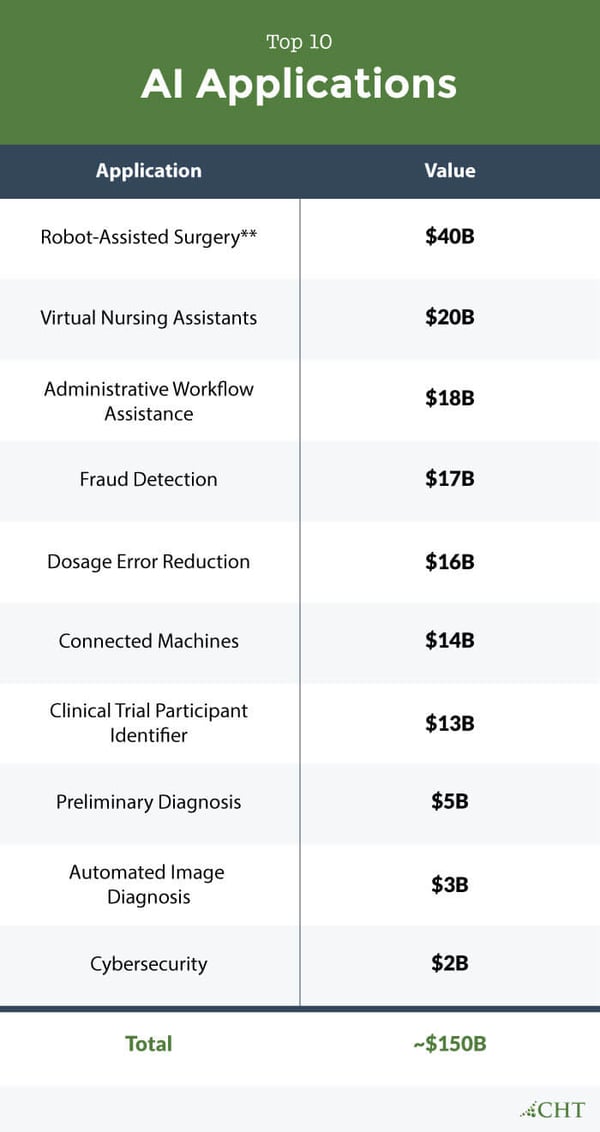
source: Accenture
Robot-assisted surgery is number one, with the highest value potential. Not only is it less expensive, but it can also increase a patient's overall treatment with less hospital time. The applications for AI are endless and can deliver high-quality and cost-effective care.
Now for the opposition...
CHAPTER 2
Barriers to Artificial Intelligence Implementation
There are pros and cons to everything, and AI is no different.
Or should we call these cons, fear?
Despite all the benefits (which we will discuss next), the fear surrounding more intelligent solutions can often be a controversial topic.
Today, there are still barriers to the widespread adoption of AI, and not just in the healthcare industry. As a whole, there are challenges that need to be addressed and overcome before moving forward and implementing AI.
R&D Magazine, which provides research and development news for more than 50 years, points out four key obstacles:
- Integration of data is complex, which can result in missing and disparate data
- Challenges such as trust, legal, and liability issues
- Time and energy limitations to consider and the need for better hardware designs
- Talent shortage - specific skills and knowledge needed to succeed with AI
Let's take a granular look at the healthcare industry.
What are the general fears of AI in healthcare?
- Fear of job replacement:
- Concern that computers will replace physicians and staff
- Less human interaction and affectionate care
- Data privacy
- Data usage could be interpreted as an infringement of a patient's right to privacy
- Understanding and learning a new technology in the workplace
- Development costs
- Cybersecurity threats or vulnerabilities
Potential Challenges in the Healthcare AI Market
The healthcare industry faces an uphill battle for full AI integration. TM Capital Corp. prepared an in-depth industry spotlight highlighting their thoughts on the nine potential challenges.
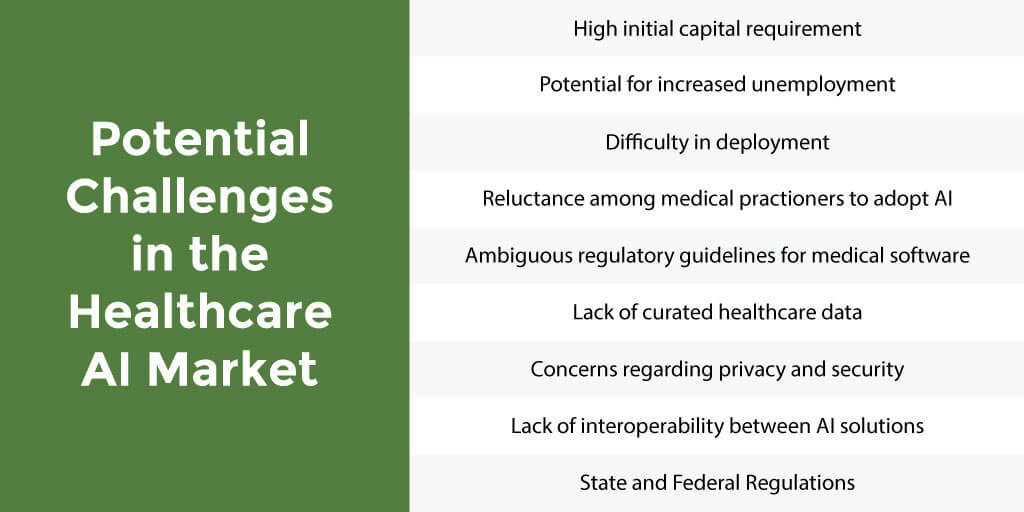
Source: Based on information gathered from Global Market Insights, "Healthcare AI Market Size, Competitive Market Share & Forecast, 2024” (2017) and Markets and Markets, “Artificial Intelligence in Healthcare Market” (2017).
According to the study, a major concern is State and Federal regulators, "they are a key hurdle facing AI."
The healthcare leadership team at TM Capital adds,
"Certificates of Need, risk-based capital requirements, and burdensome reporting can create major barriers to new entrants and innovations."
Even with its challenges, the question remains...
Do the benefits outweigh the potential challenges and fears?
Chapter 3
Advantages of Artificial Intelligence in Healthcare for an Improved Future
The healthcare AI market is projected to grow at a 34.9% to 48.0% CAGR in the next five years. And with good reason...
Artificial intelligence offers a number of advantages when exploring the healthcare landscape. It promises innovation in the healthcare system for a better future.
Let's go back and address a few of those fears from earlier:
- Computers will replace doctors.
- Not necessarily - they will complement them. AI technology can assist doctors in making better data-driven decisions.
- There can be a positive impact on the reduction in mortality rates.
- AI can help improve the efficiency of disease diagnosis, management, and treatment.
- Accessibility of information can be positive and is not always an infringement of privacy.
Keith Kirkpatrick, a principal analyst at
Based on a study by Frost & Sullivan, the market for AI has the potential to improve healthcare outcomes by 30 to 40 percent while simultaneously cutting treatment costs in half by:“AI applications are designed to address specific, real-world use cases that make the diagnosis, monitoring, and treatment of patients more efficient, accurate, and available to populations around the world.”
- Integrating information such as medical records with operating metrics which can help assist physicians.
- Reducing unnecessary hospital visits by alerting staff only when patient care is needed.
- Creating time-saving administrative duties such as voice-to-text transcription.
The benefits, including better patient care, reduced costs, and leveraging the many opportunities offered by the integration of AI, significantly outweigh the fears and challenges.
Below we highlight a quick side-by-side comparison of the pros and cons of AI in healthcare.
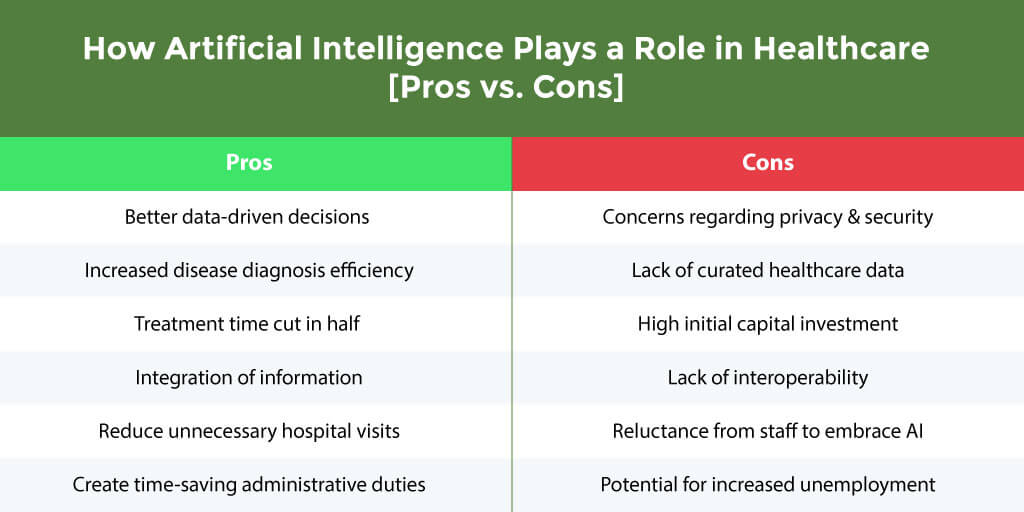
The debate over artificial intelligence in healthcare will always be present. Overall, the main goal is to develop AI safely and with
CHAPTER 4
Artificial Intelligence Study: How AI Technology Can Improve Human Lives
Location: Shanghai Changzheng Hospital, China
Problem: Highest lung cancer rates in the world
Solution: Use AI and deep learning to diagnose cancer by pairing a computerized tomography (CT) scan with AI
Infervision, a technology company that uses deep learning and AI, combined deep learning with medical data to recognize symptoms in medical images.
The AI technology learns from past imaging reports such as X-Ray, CT, MRI, etc. to assemble automatic diagnostic recommendations. The Infervision intelligent screening system "immediately pushes a warning to the doctor when it detects a medical image with subnormal symptoms."
Eliot Siegel, chairman of the Radiological Society of North America (RSNA) Medical Imagine Resource Committee commented,
"The application of AI will lead to a real digital shift in traditional medical imaging, requiring AI and people to work together to meet the challenges of the medical industry. In the process of lung nodule screening, Infervision is providing preemptive solutions that allow doctors to meet patients' needs in a short period of time."
Advantages of AI technology:
- Ability to identify early detection of high-risk diseases
- Possibility to save on medical expenses
- Can lower the cost of chronic disease management
- Provides efficient medical treatment
This is just one study demonstrating AI's ability to read medical images, saving time and increasing accuracy for a radiologist.
CHAPTER 5
The Future of Artificial Intelligence in Healthcare [2023 and Beyond]
As the healthcare industry adopts more of the latest technology, VentureBeat, a technology news company, made a few predictions about the impact of AI and automation:
“Personalized healthcare will be an even greater focus”
With the amount of data in the healthcare sphere increasing dramatically every year, AI is able to be trained on more data than ever before. This allows AI systems to personalize treatment recommendations so “specific treatment can be generated based on the patient’s profile, genetics, environment and lifestyle in order to optimize patient outcomes.”
“Legislation and regulations around healthcare AI will improve”
Legislative and regulatory bodies often err on the side of caution when regulating the use of AI technology that uses confidential data. As data in the healthcare industry increases at a 48% rate year over year (as reported by the IDC), the ability of AI to overcome unique challenges in the healthcare industry will prompt regulatory groups to create a framework and set of practices that will balance the need to protect confidential patient data with the medical benefits provided by AI.
"A wider range of applications in healthcare"
Healthcare systems have been able to see how AI can cut healthcare costs in the US, and expect the same results from expanding the use of AI in more applications.
Experts predict that AI will greatly aid drug and treatment discovery and processes, reducing the time traditionally needed for drugs and vaccines to reach the market.
“Automation, automation, and more automation”
AI will be applied for automating tasks such as handling patients’ appointments, care, and records. With AI’s ability to automate a large range of manual tasks, providers will be opened up to focus on providing better care.
Looking further into the future - 20 years from now...
Tony Hebden, Ph.D. vice president at Health Economics and Outcomes Research (HEOR) and Steve Elmore, Ph.D. vice president at Target Enabling Science and Technology, share their thoughts on how AI will impact healthcare in the future.
The Future of Artificial Intelligence in Healthcare
AbbVie. "The Future of Artificial Intelligence in Healthcare." Online video clip. YouTube. YouTube, Oct. 26, 2018. Web. Nov. 9, 2018.
Here's an excerpt from their discussion:
Steve: "Tony, where do you see AI in healthcare in the future, say 20 years from now?"
Tony: "The ability of AI to enable physicians. Rather than replace physicians, it would help in diagnoses and then aid in what would be the most effective treatment for individuals. More personalized medicine."
Steve: "I would agree. The integration of additional types of data, we track our steps, etc. - in the future, we'll be able to track our blood sugar, our lipid levels, etc...[and get] real-time feedback."
Tony: "The idea that we will be able to identify patients before they get sick, to treat a patient before they become a patient."
Steve: "Synergies between human intelligence and artificial intelligence, a doctor will have far more powerful tools to do his job."
Conclusion
The potential of artificial intelligence is difficult to ignore. The number of successful case studies and examples will continue to grow as we look toward the future of AI in healthcare.
Artificial intelligence promises to make sense of complex medical data, gain insights, and better recognize patterns in behavior. AI is a "decision engine" that can exponentially increase the effectiveness and efficiencies of healthcare organizations.
At CHT, we continue to provide innovative technology solutions that help facilities strive for a simple, safe, and secure way to manage healthcare compliance and patient safety.




